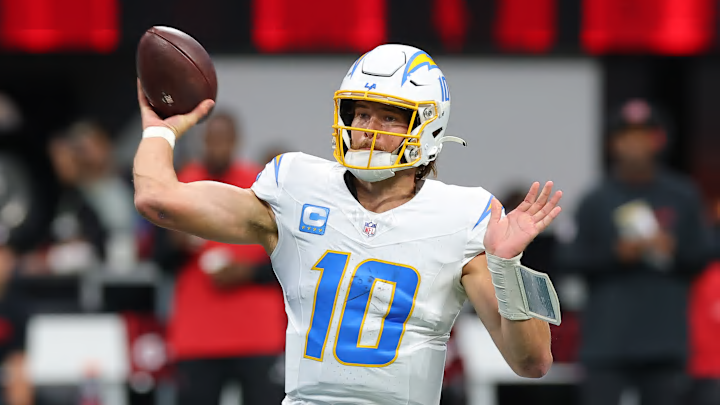Over most of the last two seasons, the Chiefs defense has been a unit that Kansas City can rely on to help them win games. But over the last few weeks, some struggles and weaknesses have begun to pop up more often. That is especially true, when considering the current play of the Chiefs' pass defense. The absence of the injured Jaylen Watson has led to inconsistency when trying to slow down opposing pass offenses.
And now, the Chiefs will be taking on a charged-up version of Justin Herbert this week. The Chargers are a real threat to create some upsets come playoff time. But for Los Angeles, the most important item from Herbert's game this season is the fact he is playing with rediscovered confidence. In addition to that, the current iteration of this Chargers' pass offense is going to provide a perfect litmus test for a Chiefs pass defense that needs a rebound. This is mainly due to their passing philosophies, concepts and play style.
Where has Herbert quietly stood out above most other quarterbacks this season? Plus, can Kansas City find clarity on who should be designated for specific roles in the secondary moving forward?
Various Success Off Play Action
The Chargers are comfortable with playing a gritty, grinding style under this new regime. But also, Los Angeles is extremely detailed and versatile with how they can attack offensively. If you just look at the passing game, Justin Herbert and the Bolts run multiple passing concepts and philosophies throughout the course of a single game. And in the end, they generally generate success in a variety of ways.
One of the spots that jumps out the most, is the success that he and the Chargers create off of play action. According to Pro Football Focus, 33.5 percent of Herbert's dropbacks have involved play action this season. His completion percentage with play action passes (74.8) is actually far greater than his completion percentage with no play action passes (58.1). Furthermore, Herbert has a much higher yards-per-attempt average with play action (9.9), compared to his yards-per attempt average without it (6.5). And while throwing it down the field, his ability to hit on more big-time throws is more evident. PFF constitutes those type of passes as throws "with excellent ball location and timing, generally thrown further down the field and/or into a tighter window."
Beyond the success that Herbert has in this area, there are plenty of options that the Chargers have at their disposal to work off of play action. They can rely on quick passes and yards after the catch once defenses look to take away the deep ball. Or, Los Angeles has been able to gain extra yards on the ground when running in what is considered to be obvious passing downs.
Chargers Will Throw Full Plate At Chiefs
Let's go back to the amount of pass concepts that the Chargers will incorporate. Simply put, Los Angeles will likely throw a full menu at Kansas City. The screen game is an area where this team has improved in this season. Both digs and slants are used at a fair rate as well. Part of that success is the timing and accuracy that Herbert has over the middle of the field. But also, the Chargers can create a great amount of frustration with out patterns and corner routes.
Much of this is due to the variance in current Chargers pass catching group. There are vertical threats who can separate over the top with Quentin Johnston and Josh Palmer. Those pieces can also win vertically in contest catch situations more often than not. Rookie Ladd McConkey is also able to shake any defender by working horizontally or on two-way go options. More importantly, McConkey is incredibly smart at utilizing leverage and leaving defensive backs in precarious positions.
How Litmus Test Will Help Chiefs
When you look at where the Chiefs have truly struggled as a pass defense in the last few games, timing and being out of position have stood out. Against Buffalo and Carolina, too many Kansas City defensive backs were getting left in coverage. The eye discipline was not where it needed to be. As a result, pass catchers in those two games were able to drift into soft spots in coverage and hit on explosive plays.
Elsewhere, the Chiefs have been unable to impact pass catchers with any level of physicality. The ways in which Kansas City can clamp down receiving options in press coverage is underrated, when this defense is rolling. But when the recent mistakes have popped up, their ability to stay on top of pass catchers has been erased. This litmus test of the current Chargers' pass offense will allow the Chiefs to work on eye discipline while Herbert is in the pocket. It will also allow Kansas City chances to match the physical presence of the LA separators.
Results Against Chargers Can Help Determine Roles
Kansas City could very well be relying on inexperienced cornerbacks to pair with Trent McDuffie during this stretch run. Whichever results we see on Sunday, should help determine clearer roles moving forward for this Chiefs pass defense. Does Joshua Williams continue to impress like he did last week on the outside? Is Chamarri Conner going to stay in more of a safety hybrid role? Can Nazeeh Johnson be trusted? Or, will Ketih Taylor get more looks as a depth piece?
Along with designating those exact roles, the Chiefs must figure out how many snaps are being allocated to certain defensive backs. If that does not become more concrete, Kansas City is going to be challenged further by failing to give specific players more high-leveraged chances. Finding out the true ceilings of some of these defensive backs will also potentially help the Chiefs in determining who is worth bringing back next year.
